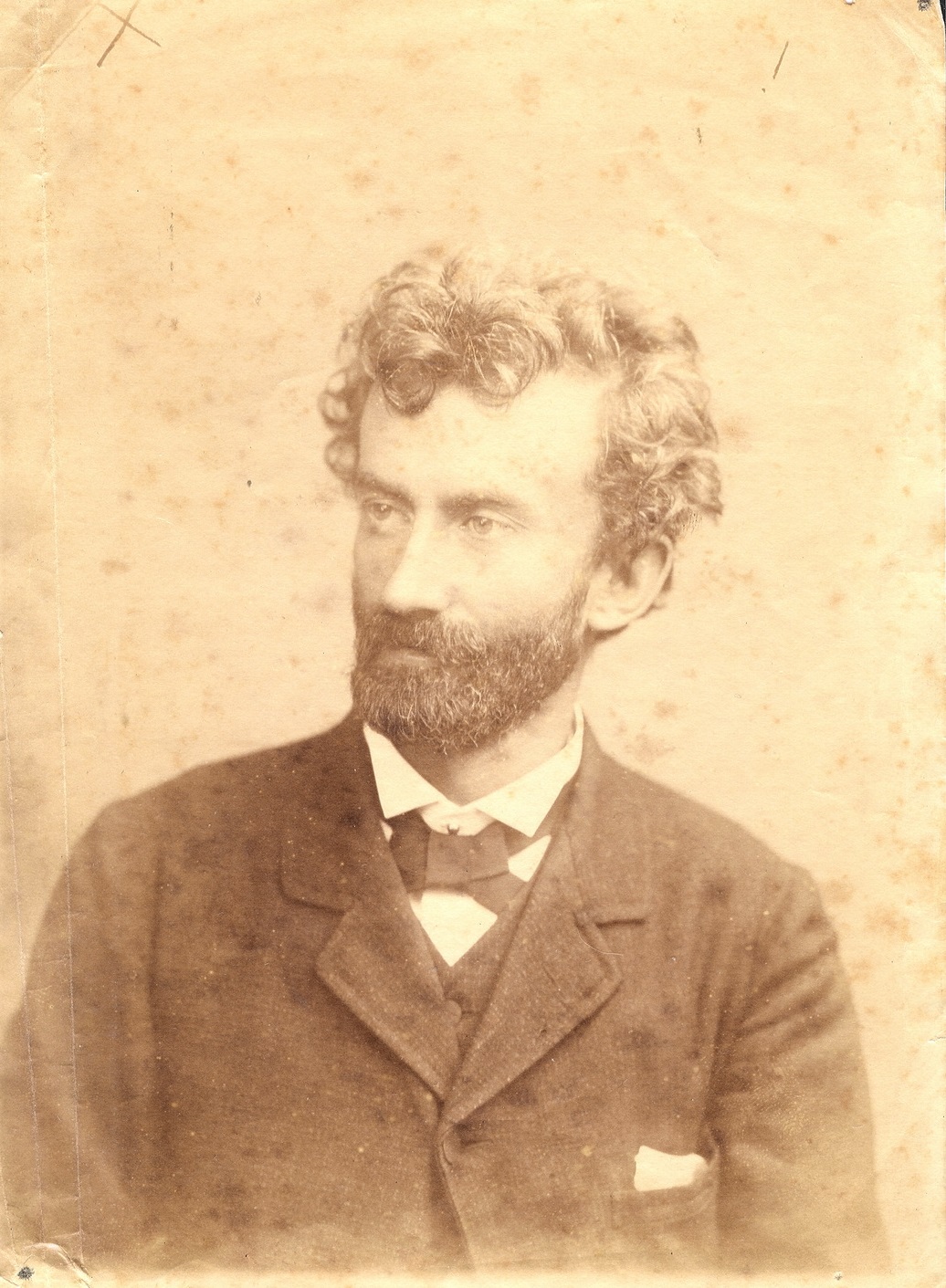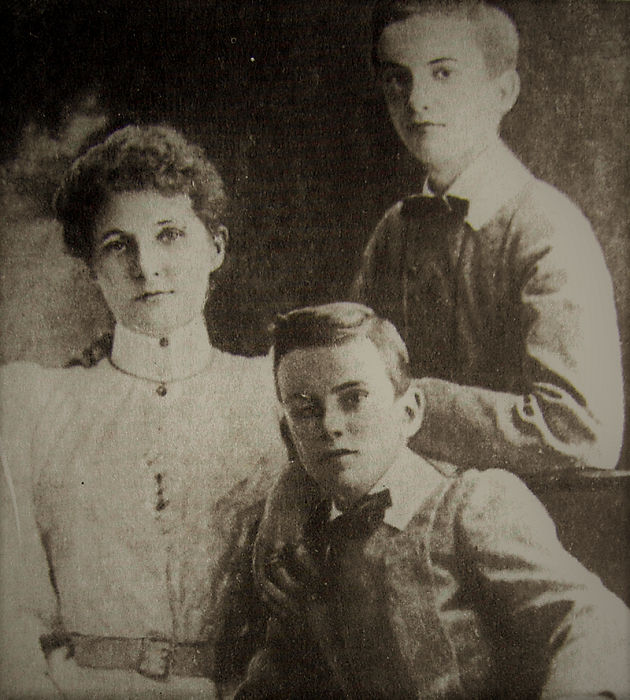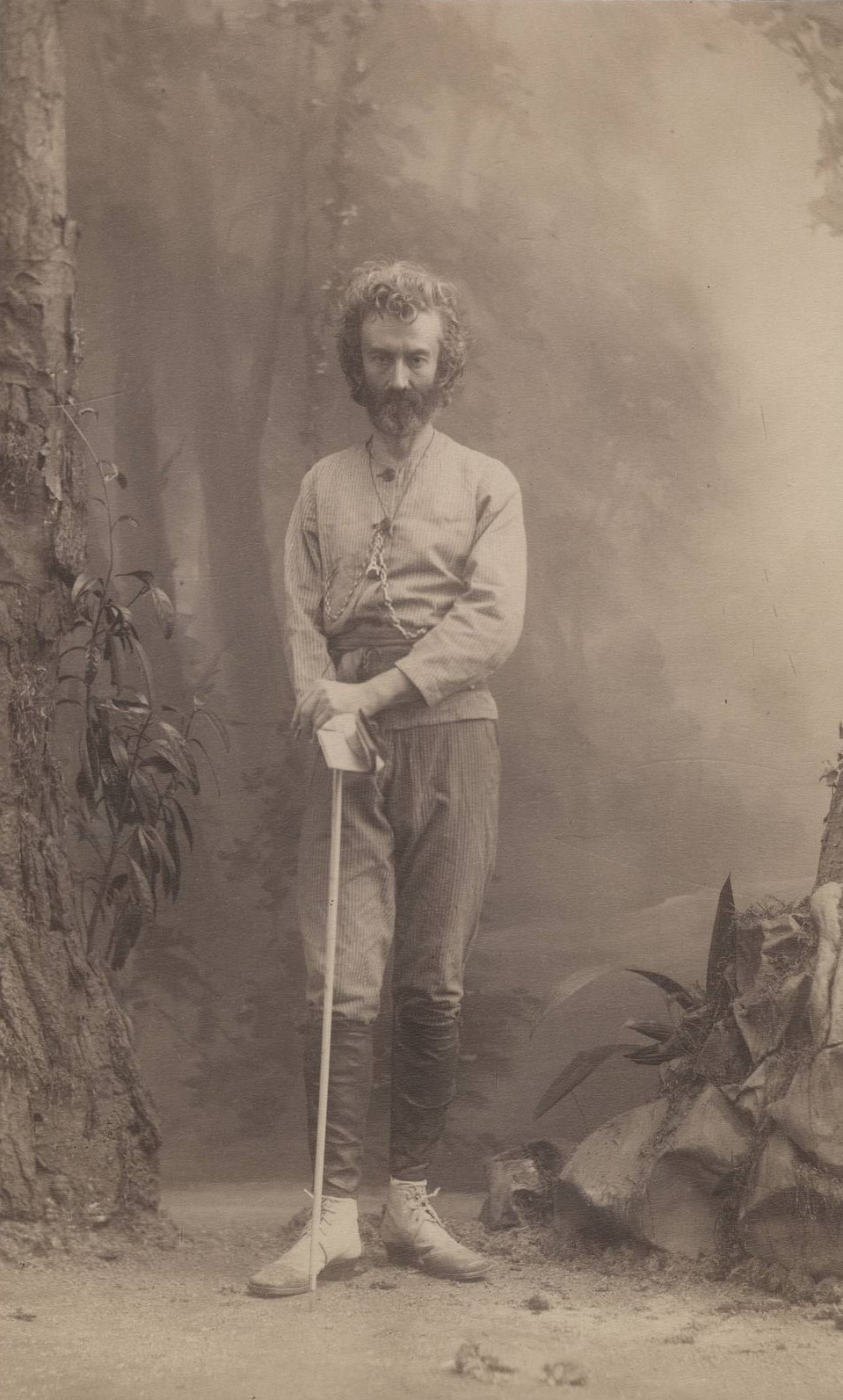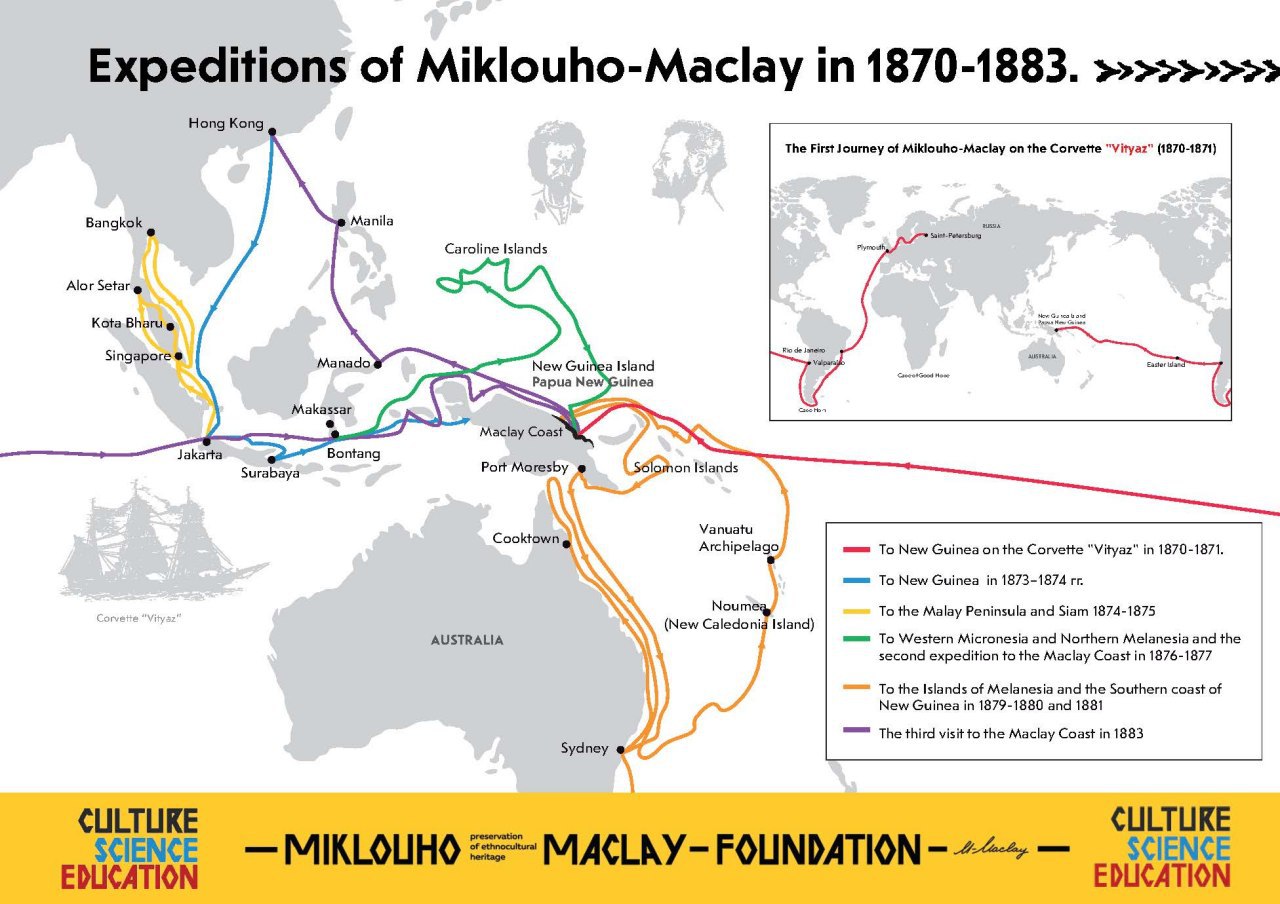Life story of Nikolay Nikolaevich Miklouho-Maclay (1846-1888 гг.)
In the world and national history N.N. Miklouho-Maclay is an outstanding humanist, scientist, traveler and public figure who always followed the humanistic principles of respect for the culture and traditions of the peoples of the world, and fought for the rights of residents of Southeast Asia and Oceania.
The future world-famous explorer and traveler was born in Yazykovo-Rozhdestvenskoye village of Novgorod Governorate in 1846. As a student, he was looking for himself: he studied in Saint-Petersburg and Germany at various faculties. Subsequently, N.N. Miklouho-Maclay chose the medical faculty at the University of Jena, as the scientist was well aware that his further research would require knowledge in several sciences. The Russian scientist can fairly be called a naturalist or a generalist (a person with a wide array of knowledge on a variety of subjects).
In 1866-1869, Miklouho-Maclay made expeditions to North Africa, mainly to study marine fauna. Already during the trip along the Red Sea сoast, the traits that determined the future life of the Russian scientist were revealed – a penchant for difficult and dangerous adventures, a deep interest in the way of life and culture of the peoples of the world. In 1869 Miklouho-Maclay returned to Saint-Petersburg and a year later the scientist presented to the Imperial Russian Geographical Society (IRGS) his project of a multi-year expedition to the Pacific Ocean, during which he planned to study its northern part and conduct zoological, anthropological and ethnographic research. IRGS accepted the project and promised to assist.
Already in the process of preparing for the expedition, the scientist’s plans have changed a lot. Scientific literature, conversations and correspondence with leading Russian and world scientists gave N.N. Miklouho-Maclay an idea to start this long-term research in New Guinea — a huge Island in Oceania, still unknown place of the planet for Europeans. With an extraordinary talent and passion for scientific knowledge N.N. Miklouho-Maclay has been conducting ethnographic and anthropological research in Southeast Asia, as well as in all cultural areas of Oceania (Melanesia, Polynesia, Micronesia) for more than 15 years. Most of the works of the Russian humanist scientist are devoted to the inhabitants of the northeastern coast of New Guinea (the Maclay Coast), among whom he had lived for two and a half years and visited those places three times (1871-1872, 1876-1877 and 1883). Miklouho-Maclay managed to establish friendly contact and good relations with the residents of the Maclay Coast, as well as to learn some of their languages. With his patience, kindness, responsiveness and courage N.N. Miklouho-Maclay won the trust, love and loyalty of the local residents. In fact, he “opened” New Guineans to the outside world. It was the place where Miklouho-Maclay had lived most of the time spent in New Guinea, and called this coast the Maclay Coast “by right of the first European settled there, who explored the coast and achieved scientific results”.
During his expeditions to Southeast Asia and Oceania, the Russian scientist described in detail the economy, everyday life, material culture, customs and traditions of local residents, paying special attention to their original art. The diary records of N.N. Miklouho-Maclay still remain an unsurpassed source on ethnography of New Guinea, because of the accurate factual information, since the Russian scientist tried to refrain from adding various guesses and hypotheses to his personal observations.
The scientist’s drawings made during the expeditions are also a valuable ethnographic and anthropological source, because they «differ in the accuracy of proportions, details, and clearly reflect both the anthropological type and the human personality». N.N. Miklouho-Maclay made more than 700 drawings.
It was during the time of N.N. Miklouho-Maclay that human races and their features were ardently debated. Many Western scientists have tried to prove that human races are not equal. These theories were later used either by slaveholders or in order to justify colonial expansion. The danger of such ideas was obvious to Miklouho-Maclay. A number of European scientists considered Papuans an intermediate link between apes and humans, and relied on rather absurd arguments about the «tuft-like» growth of hair and the «roughness» of skin of New Guineans. During his expeditions to the northeastern coast of New Guinea, N.N. Miklouho-Maclay found irrefutable evidence that the local people in their physical and mental properties do not differ from Europeans, which showed the inconsistency of racist views. With the example of the Papuans of the North-East of the Island of New Guinea Miklouho-Maclay proved to the whole world that there were no superior or inferior race and all people are equal by nature. Moreover, Nikolay Miklouho-Maclay throughout his life fought for the rights of the peoples of the Pacific Ocean, protecting them from despotism of European slave traders and colonizers.
Nikolay Miklouho-Maclay is the author of about 160 scientific papers in ethnology, anthropology, meteorology and oceanology, etc., published in Russian, English, German and other European languages. Moreover, the results of his research formed the basis for a number of publications around the world on the life of Miklouho-Maclay, one of which is the Russian six-volume edition (in seven books), the most complete collection of works to date, which soon is going to be reissued.

Photo of Nikolay Muklouho-Maclay

Nikolay Miklouho-Maclay’s Wife Margaret Robertson and thier two sons Alexander and Vladimir (Nils and Allan)

N.N. Miklouho-Maclay in expeditionary suit

Almost a century and a half has passed since the first expeditions of Miklouho-Maclay to Southeast Asia, as well as to the distant Island of New Guinea. During this time, the world has undergone huge changes, but the scientific and social feat of the Russian scientist and his rich heritage still serve for the benefit of friendship and cooperation around the world. The material collected by Miklouho-Maclay is still relevant to science and everyday life, and the Russian traveler’s accurate data of the inhabitants of Southeast Asia and Oceania has become the first true evidence of the population of this region. Moreover, the works and humanistic principle of N.N. Miklouho-Maclay give modern people an idea of the need to preserve traditions, as well as respect for the traditions and culture of the peoples of the world.
Noteworthy that N.N. Miklouho-Maclay always considered himself a zoologist, but later he was acknowledged by world and Russian science as an ethnographer. It is no coincidence that his humanistic ideas are the embodiment of the commandments of an ethnographer:
- Ethnography is the crown of all the humanities because it makes a comprehensive study of all peoples and all mankind, past and present;
- You shall not make for yourself an idol of your people, your religion, or your culture. You should know that all people are created equal: there is no Greek or Jew, no white or coloured. He who knows one ethnos knows none; he who knows one religion knows none;
- You shall not profane science, or defile ethnography by career-seeking – a true ethnographer is he who nourishes enthusiasm for science and bears love for mankind and Man;
- Six days you shall labour, but on the seventh day, you shall draw conclusions. Remember that you owe a debt to the public and science;
- Honour your great predecessors and teachers in academic and public life, and you will be duly honoured;
- You shall not kill science with forged facts, superficial observations, and hasty conclusions.
- You shall not change your once chosen profession of an ethnographer. He who has entered upon the path of ethnography, shall not wander from it;
- You shall not plagiarise;
- You shall not bear false witness against your neighbour, other peoples, their spirit and rites, customs and mores, etc. Love your neighbour more than yourself;
- You shall not impose your culture on the ethnos you explore. Treat this ethnos with care and alertness, love and attention, whatever the stage of their cultural development – and they will strive to rise to the level of higher cultures.
In addition, N.N. Miklouho-Maclay lived in Australia for about seven years, where he received a warm welcome: the traveler quickly became close to Australian scientists and soon became a member of the Linnean Society, the leading scientific organization in Australia. At the same time, Miklouho-Maclay traveled deep into the Australian continent, where he conducted zoological and anthropological research, as well as paleontological excavations. In Australia, Nikolay met his future wife, Margaret Robertson, the daughter of the Premier of New South Wales. Later they had two sons, Alexander and Vladimir (Nils and Allan).
In 1886, after more than 20 years of expeditions to Southeast Asia and Oceania, N.N. Miklouho-Maclay returned to Russia, where he became a living legend, and then brought his wife and sons to Saint-Petersburg. After a long struggle with an illness caused by complications from malaria, dengue fever, and rheumatism, N.N. Miklouho-Maclay died suddenly on April 14, 1888, at the age of 41.
After the death of Nikolay Nikolaevich, his widow and children returned to Sydney. Until 1917, she received a pension for the children support from the Russian Government. She gave her husband’s works and collections to the Russian Geographical Society, and now they are stored in Saint-Petersburg, in the Museum of Anthropology and Ethnography named after Peter the Great (Kunstkamera).
For his contribution to world and national science, as well as humanistic ideas that were long ahead of their time, in 1996, N.N. Miklouho-Maclay was acknowledged by UNESCO as a «Global citizen» in honor of the 150th anniversary of his birth.
Of course, Nikolay Miklouho-Maclay is one of the most outstanding scientists and travelers of the second half of the XIX century, who made an invaluable contribution to world science, and his humanistic ideas are still relevant today. In the time of aggravation of interethnic problems in almost all regions of the world, the progressive ideological heritage of Miklouho-Maclay on the equality of races and peoples, on the inadmissibility of violent suppression of cultures, on the imposition of other people’s stereotypes, on the implementation of colonial or violent cultural expansion are of particular importance. Results of the scientific research and published books are a solid and scientifically impeccable tool, a basis for countering reactionary power and nationalist tendencies, which will become a powerful weapon in fostering a sense of tolerance among the present generation.
